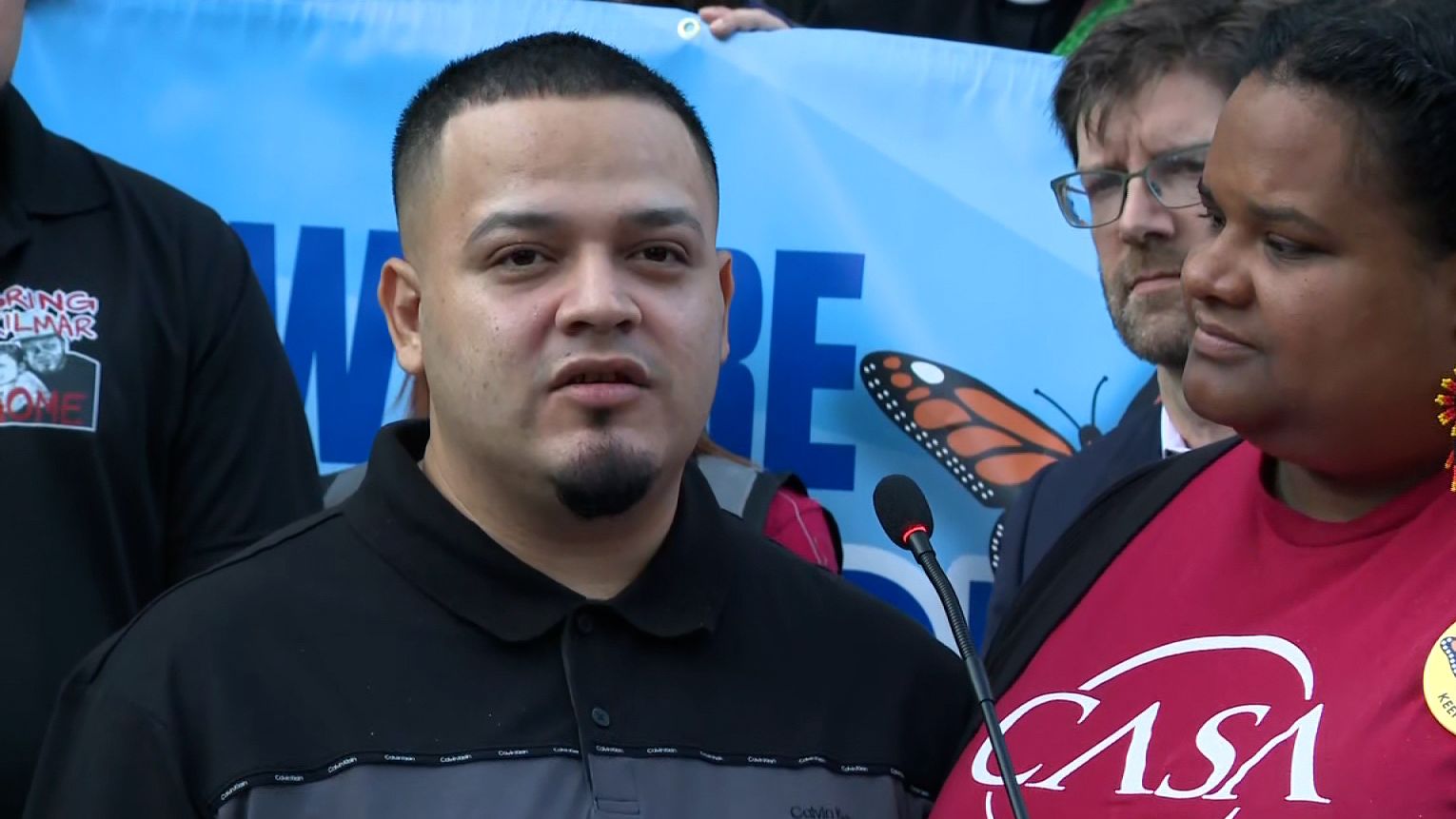
Federal judge blocks Abrego Garcia deportation, extending court fight
Entities mentioned:
- Judge Paula Xinis: Justice, Duty, Obligation
- Trump administration: Control, Power, Security
- Kilmar Abrego Garcia: Self-preservation, Freedom, Security
- Immigration and Customs Enforcement (ICE): Duty, Control, Security
- Drew Ensign: Duty, Professional pride, Loyalty
Article Assessment:
Credibility Score: 75/100
Bias Rating: 45/100 (Center)
Sentiment Score: 40/100
Authoritarianism Risk: 35/100 (Generally Democratic)
Bias Analysis:
The article presents a balanced account of the legal proceedings, including perspectives from both the judge and the Justice Department. While it provides more detail on the arguments against deportation, it also includes the administration's position, maintaining a relatively neutral stance.
Key metric: Immigration Enforcement Effectiveness
As a social scientist, I analyze that this case highlights the ongoing tension between the Trump administration's aggressive immigration enforcement policies and the judicial system's role in ensuring due process. The judge's decision to block the deportation reflects a concern for proper legal procedures and potential human rights issues. This case may impact the administration's ability to quickly deport individuals to third countries, potentially affecting overall deportation rates and the perceived effectiveness of immigration enforcement policies. The involvement of Uganda as a potential deportation destination introduces new complexities to U.S. immigration practices, potentially setting precedents for future cases.

Trump administration might deport Kilmar Abrego Garcia to Uganda
Entities mentioned:
- Trump administration: Control, Power, Righteousness
- Kilmar Abrego Garcia: Self-preservation, Freedom, Justice
- Department of Homeland Security: Control, Security, Duty
- Simon Sandoval-Moshenberg: Justice, Moral outrage, Professional pride
- Judge Paula Xinis: Justice, Duty, Control
- Costa Rica government: Unity, Obligation, Security
- Judge Waverly Crenshaw: Justice, Duty, Impartiality
Article Assessment:
Credibility Score: 75/100
Bias Rating: 45/100 (Center)
Sentiment Score: 35/100
Authoritarianism Risk: 65/100 (Authoritarian Tendencies)
Bias Analysis:
The article presents multiple perspectives, including those of the government and Abrego Garcia's lawyers. While it gives more space to the defense's arguments, it also includes the government's actions and intentions, maintaining a relatively balanced approach.
Key metric: Immigration Enforcement Effectiveness
As a social scientist, I analyze that this case highlights the complex interplay between immigration policy, criminal justice, and international relations. The Trump administration's aggressive stance on immigration is evident in their attempt to deport Abrego Garcia to Uganda, a country with no apparent connection to him. This move suggests a prioritization of deportation over due process, potentially undermining the integrity of the justice system. The involvement of Costa Rica as a potential destination introduces diplomatic considerations and suggests some level of international negotiation in immigration cases. The lawyers' accusations of vindictive prosecution raise questions about the fairness of the legal process and the potential use of deportation as a punitive measure. This case could have significant implications for how immigration enforcement is perceived and conducted, potentially affecting public trust in the system and international relations.

Judge to require that Kilmar Abrego Garcia remain in the US while he challenges deportation to Uganda
Entities mentioned:
- Kilmar Abrego Garcia: Justice, Self-preservation, Freedom
- Judge Paula Xinis: Justice, Duty, Professional pride
- Trump administration: Control, Power, Determination
- US Immigration and Customs Enforcement (ICE): Duty, Control, Security
- Lydia Walther-Rodriguez (CASA): Justice, Moral outrage, Advocacy
- Simon Sandoval-Moshenberg: Justice, Professional pride, Duty
- Sen. Chris Van Hollen: Justice, Duty, Advocacy
Article Assessment:
Credibility Score: 75/100
Bias Rating: 40/100 (Lean Left)
Sentiment Score: 35/100
Authoritarianism Risk: 30/100 (Generally Democratic)
Bias Analysis:
The article leans slightly left, giving more space to perspectives sympathetic to Abrego Garcia and critical of the Trump administration. However, it does include factual information about the legal proceedings and some government perspectives, maintaining a degree of balance.
Key metric: Immigration Policy Effectiveness
As a social scientist, I analyze that this case highlights significant tensions in U.S. immigration policy and its implementation. The article portrays a complex legal battle involving multiple government entities and advocacy groups, centering on the rights of an individual facing deportation. The case of Kilmar Abrego Garcia exemplifies the challenges in balancing national security concerns with individual rights and due process. The involvement of a federal judge intervening in the deportation process suggests potential overreach or procedural issues within the immigration enforcement system. This case may have broader implications for immigration policy, potentially influencing future legal precedents and public perception of the immigration system's fairness and effectiveness.

Kilmar Abrego Garcia has been released from criminal custody, 5 months after he was unlawfully deported
Entities mentioned:
- Kilmar Abrego Garcia: Justice, Freedom, Self-preservation
- Trump administration: Power, Control, Righteousness
- CASA: Justice, Moral outrage, Unity
- Sean Hecker: Justice, Professional pride, Duty
- Federal prosecutors: Duty, Justice, Control
- Judge Waverly Crenshaw: Justice, Duty, Righteousness
- Judge Paula Xinis: Justice, Duty, Righteousness
- ICE: Control, Duty, Security
- Simon Sandoval-Moshenberg: Justice, Moral outrage, Duty
Article Assessment:
Credibility Score: 75/100
Bias Rating: 40/100 (Lean Left)
Sentiment Score: 35/100
Authoritarianism Risk: 25/100 (Generally Democratic)
Bias Analysis:
The article leans slightly left, emphasizing the perspective of Abrego Garcia and his attorneys while presenting government actions critically. However, it does include multiple viewpoints and court decisions, maintaining a degree of balance.
Key metric: Immigration Enforcement and Due Process
As a social scientist, I analyze that this case highlights significant issues in the U.S. immigration system, particularly regarding due process and the potential for wrongful deportation. The article demonstrates a complex interplay between judicial, executive, and advocacy entities, each with distinct motivations. The case of Kilmar Abrego Garcia reveals tensions between strict immigration enforcement policies and constitutional rights, potentially impacting public trust in government institutions and the fairness of the immigration system. The involvement of multiple federal judges issuing contradictory rulings underscores the complexity of immigration law and the potential for conflicting interpretations. This case may serve as a precedent for similar cases, potentially influencing future immigration enforcement practices and policies.

Abrego Garcia’s lawyers urge judge to drop his criminal case, alleging ‘vindictive and selective prosecution’
Entities mentioned:
- Kilmar Abrego Garcia: Justice, Self-preservation, Freedom
- US Department of Justice: Control, Power, Revenge
- Judge Waverly Crenshaw: Duty, Justice, Obligation
- President Donald Trump: Power, Control, Righteousness
- Attorney General Pam Bondi: Loyalty, Power, Control
- Judge Paula Xinis: Justice, Duty, Obligation
Article Assessment:
Credibility Score: 75/100
Bias Rating: 45/100 (Center)
Sentiment Score: 35/100
Authoritarianism Risk: 65/100 (Authoritarian Tendencies)
Bias Analysis:
The article presents both the defense's arguments and the government's actions, maintaining a relatively balanced perspective. While it gives more space to the defense's claims, it also includes factual background and judicial decisions, avoiding overtly partisan language.
Key metric: Rule of Law Index
As a social scientist, I analyze that this case highlights significant tensions between executive power and judicial oversight in the U.S. immigration system. The alleged retaliatory prosecution of Abrego Garcia following his successful challenge to his deportation raises concerns about the abuse of prosecutorial discretion and potential violations of due process. This case could have broader implications for the Rule of Law Index, particularly in areas of government powers, fundamental rights, and criminal justice. The apparent disconnect between court orders and executive actions suggests a weakening of institutional checks and balances, which could negatively impact the U.S.'s performance on this metric. Moreover, the case underscores the complexities and potential injustices within the immigration enforcement system, which could further erode public trust in legal institutions and the fair application of law.